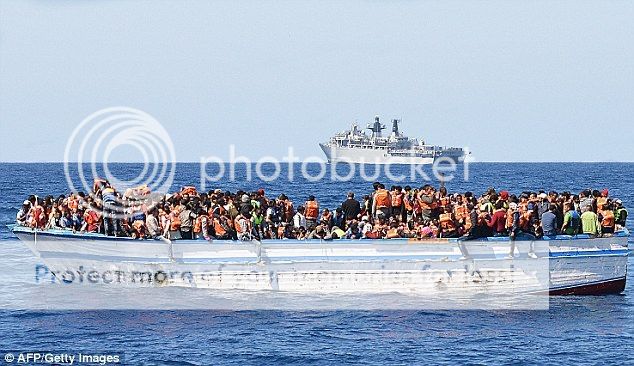- Joined
- Jul 12, 2014
- Messages
- 26,678
- Reaction score
- 55,648
- Points
- 151
All summer the news has covered the unfolding catastrophe that is the Migration Crisis along the southern borders of the European Union. Not only is it a humanitarian crisis triggered by unceasing warfare in Africa and the Middle East, but also the ravages of climate change in already marginal agricultural areas.

Moreover, it is an economic and social crisis as Europe attempts to absorb millions of people arriving with no money, no food and little education. Some European nations are reacting by closing borders (Hungary), erecting border controls in the Schengen Area (Denmark, Slovakia) and reevaluating asylum policies as discontent rises amongst European populations over the crime and poverty that coincided with large influxes of immigrants.
Sweden, a nation long open to immigrants (33% of the population is not Swedish born), is now considering new regulations as crime skyrockets to unprecedented levels (30 bomb attacks this summer) in their third largest city, Malmo, (now majority migrant) as housing and jobs become scarce. Some are attempting to do what they can (Germany) to help the migrants but can't deal with raw numbers coming in (300,000 this year alone arrived in Germany).
Populist parties long considered fringe players, like the Swedish Democrats, now top the polls. In the US, the rise of Donald Trump as the GOP front-runner mirrors the EU's discontent as the American public confronts a government that has long talked of comprehensive immigration reform but has passed no meaningful legislation. Indeed, it has long been fashionable in the EU to view any discussion of immigration reform as an exercise in racism. However, we know see that no discussion of the matter has led to devastating consequences and has allowed irresponsible actors like Trump and the Swedish Democrats to control the narrative.
How should the EU and US respond to the growing crisis? Should they allow migrants in? Do native cultures have the right to not be overwhelmed by unlimited immigration? Should they manage immigration or should they help solve the underlying problems of war, poverty and climate change? Maybe all of the above.
Good article on why this has become such a huge issue in so short a time. And yes, we actually can blame the US (Libya and Syria) for much of this....
http://www.gatestoneinstitute.org/6146/europe-migration
@gourimoko @jking948 @jlj3184

Moreover, it is an economic and social crisis as Europe attempts to absorb millions of people arriving with no money, no food and little education. Some European nations are reacting by closing borders (Hungary), erecting border controls in the Schengen Area (Denmark, Slovakia) and reevaluating asylum policies as discontent rises amongst European populations over the crime and poverty that coincided with large influxes of immigrants.
Sweden, a nation long open to immigrants (33% of the population is not Swedish born), is now considering new regulations as crime skyrockets to unprecedented levels (30 bomb attacks this summer) in their third largest city, Malmo, (now majority migrant) as housing and jobs become scarce. Some are attempting to do what they can (Germany) to help the migrants but can't deal with raw numbers coming in (300,000 this year alone arrived in Germany).
Populist parties long considered fringe players, like the Swedish Democrats, now top the polls. In the US, the rise of Donald Trump as the GOP front-runner mirrors the EU's discontent as the American public confronts a government that has long talked of comprehensive immigration reform but has passed no meaningful legislation. Indeed, it has long been fashionable in the EU to view any discussion of immigration reform as an exercise in racism. However, we know see that no discussion of the matter has led to devastating consequences and has allowed irresponsible actors like Trump and the Swedish Democrats to control the narrative.
How should the EU and US respond to the growing crisis? Should they allow migrants in? Do native cultures have the right to not be overwhelmed by unlimited immigration? Should they manage immigration or should they help solve the underlying problems of war, poverty and climate change? Maybe all of the above.
Good article on why this has become such a huge issue in so short a time. And yes, we actually can blame the US (Libya and Syria) for much of this....
http://www.gatestoneinstitute.org/6146/europe-migration
@gourimoko @jking948 @jlj3184
Last edited:

